Why Koalas Sleep more than 20 Hours a Day?
Koalas almost sleep 20 hours a day. Koalas are a big fan of sleeping. They spend most of their timing in sleeping while the remaining 4 to 5 hours they spend in eating and occasionally mating as well. Sleeping this much longer is very unusual for a herbivore and a marsupial animal. Sleeping 18 to 20 hours a day is usually common within carnivore animals.
Koalas on average sleep around 20 hours per day. This sleep interval is unusually higher in koalas as compared to the other herbivore animals.
Lions and tigers are the perfect example in this regard. However; Koalas are one of the very few herbivore animals which sleep almost 20 hours per day. Herbivore animals are known for grazing throughout the day and some experts believe that they almost sleep for only 5 minutes per day. However; Koalas are unique in this regard and they spend most of their time sleeping.
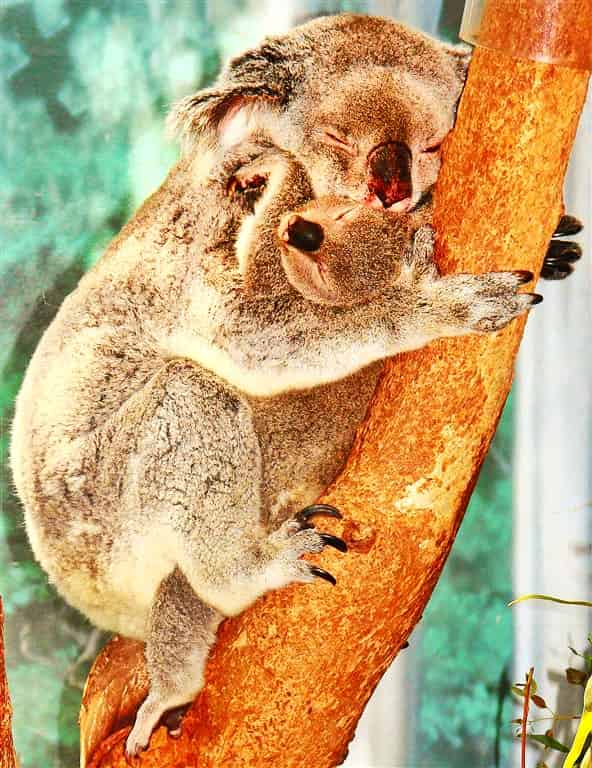
But why do the koalas sleep more than 20 hours per day? The answer lies within metabolism rate of the koalas!
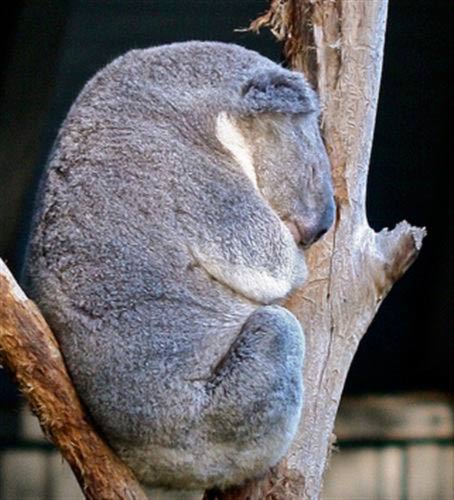
There is a very simple biological reasoning that explains about the sleeping habits of the koalas i.e., Koalas have to maintain a very slow metabolism rate which helps them to conserve and save their body energy. Therefore; the Koalas slow down their metabolism rate by preferring to lay down static on trees and eventually start sleeping.
Koalas sleep more than 20 hours a day to slow down their metabolism rate which helps them to conserve their body energy.
This activity helps koalas in maintaining their energy levels and slowing down their metabolism rates. Furthermore; it will not be wrong to relate sleeping habit of the koalas to the animals that hibernate in the winter because such animals also slow down their metabolism rates to conserve their body energy. Laslty; do remember the fact that Koalas only eat Eucalyptus leaves which are also very low in calories and energy. Therefore; saving the body energy by laying down static through sleeping seems to be the best option for the koalas.
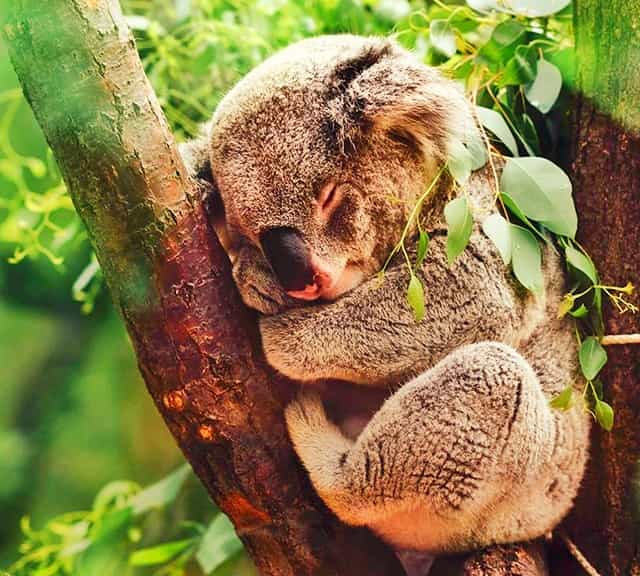
There seems to be another reason which explains about the long sleeping habits of koalas and that is digestion of the food.
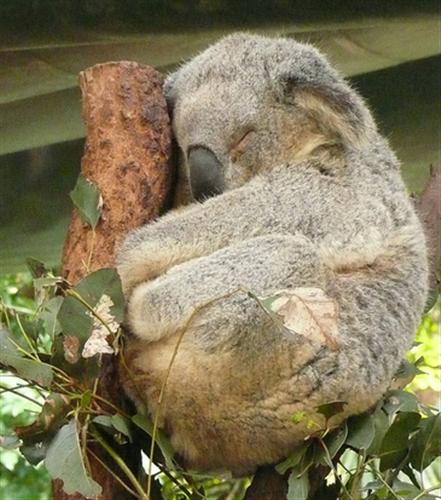
Another key reason for the Koalas to sleep more than 20 hours per day is related to their food digestion as well. The medical term sleeping helps in proper digestion applies perfectly in this scenario. We already know that Eucalyptus is a very poisonous food and offers little amount of calories for koalas. Yet still koalas have to eat it and digest it as well.
Koalas also sleep more than 20 hours a day to properly digest their notorious food of eucalyptus leaves.
No other animal dares to eat the Eucalyptus leaves but Koala. In order to digest this food properly, a long sleep is decisive in this regard. Therefore; sleeping for more than 20 hours also helps koalas to digest their notorious food of Eucalyptus leaves. Furthermore; we can also conclude that big sleep is a core for the survival of a koala and without a big sleep a koala may become weak and even die.
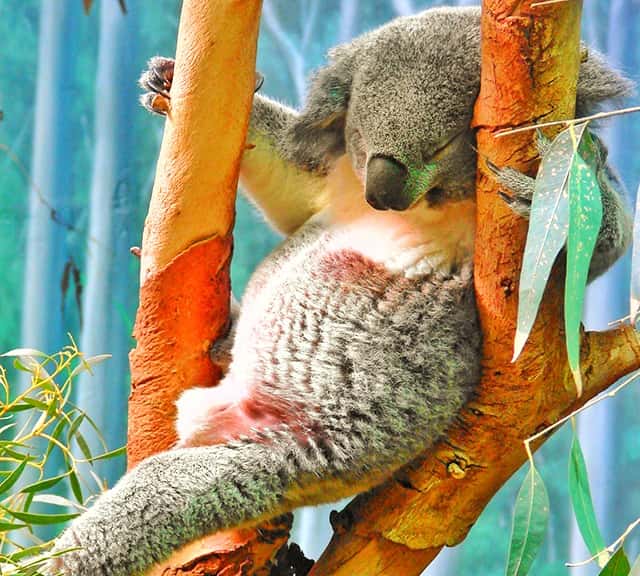
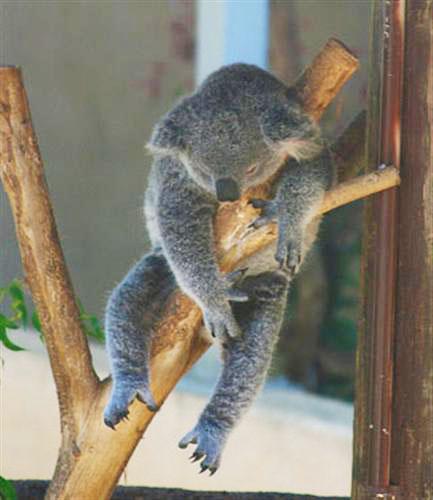
Despite sleepy; koalas are very much alert of anything unusual happening in their surroundings. A koala quickly moves around whenever a danger is triggered within the surroundings. Furthermore; if a koala feels threatened it has the ability to quickly move to safety before a predator strikes it. But trees are only safety for a koala. This is where they sleep and feel the most secure.
Despite being sleepy; koalas are usually aware of the dangers in the surroundings.
On a ground; a Koala is a perfect prey for the animals such as dingoes because they can't outrun such fast and agile animals. Therefore; the ground penetration of the koalas is almost out of an equation and they prefer to stay and sleep on long eucalyptus trees of Australia.
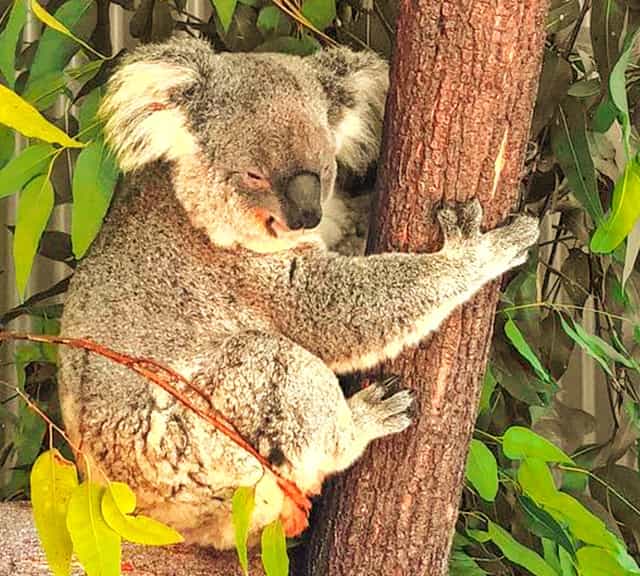
One can wonder; whether koalas remain sluggish like sloths? But this is not true. Koalas even though are not one of the sharpest and quickest ones within the animal kingdom but they are certainly not as sluggish as sloths.
Despite sleepy; koalas should not be considered as sluggish creatures like sloths.
However; koalas are not as agile as cats or monkeys on the trees. When a koala wants to switch a tree; it has to climb down the tree and then have to climb up the next tree again. Therefore; koalas stay on the ground for a very brief period of time and they never sleep on the grounds.
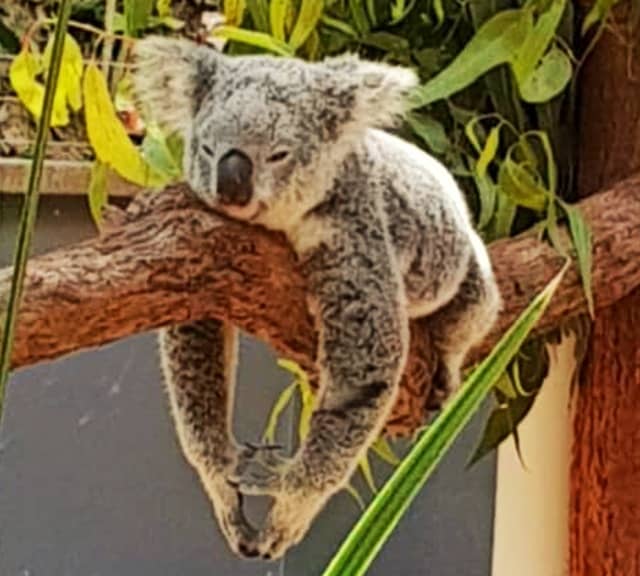
Liger Articles
Marsupials vs. Placental Mammals
Koalas are most popular animals in Australia
Koalas are more popular as compared to Kangaroos
Koalas and their Dominant Nose
Button Shaped Fascinating Eyes of the Koalas
Core Recognizing Features of Koalas
Koalas are the largest tree climbing Mammals in Australia - Koalas as Arboreal
Sizes of Koalas from Queensland, Australia
Sizes of Koalas from Australia's Victorian Origin
Difference between Queensland and Victorian Koalas
Average Weights of Male Koalas
Weighing Male vs Female Koalas
Male Koalas have Loudest of voice among all Australian Mammals
Origin of Koalas & their Evolution
Koalas Population Increased at the end of 20th century
Historical Evolution of the Koalas - A Physical Perspective
Koalas and their Aboriginal and Native Names
It Took 10 years for Aboriginal Australians to Spot and Recognize Koalas
Koalas Live Hardest and Toughest Lives Among all animals
Koalas Tooth Decay through its Abrasive Diet
Koalas Diet is Fully Poisonous and Toxic
Koalas' Food Eucalyptus has Lower Nutrition
Koalas have Lower Energy Levels
Koalas - When Occasionally Spotted on other Leaves for their Food
Why Koalas drink little or no Water?
Koalas & their Advanced Digestive Mechanisms
Why Koalas Sleep more than 20 Hours a Day?
Koalas Lack Energy and Strength
Koala's Tooth from Growth till Tooth Decay
Young Koalas are Better Chewers as Compared to Mature and Elderly Koalas
Why Most Koalas Die of Starvation?
Heat Exhaustion and Heat Strokes among Koalas
Do Koalas lack Intellectual Abilities?
Koalas and their Sense of Smell
Koalas Love Fresh Eucalyptus Leaves as their Food
Koalas' Eucalyptus Leaves' Preferences during summers and Winters
Koalas' Preference for Leaves Having Higher Nitrogen Levels
Koalas Prefer Big Eucalyptus Trees and Love to Stay at Trees' tops.
Koalas Prefer to Live in Areas that have Good Soil and Fertile Lands
Koalas' Per Day Food Consumption
Koalas Food Consumption Depends upon their Body Size
Lactating Female Koalas Consume More Food as Compared to the Normal Female Koalas
Koalas Consume More Food during Winters as Compared to Summers
Female Koalas are very Selective Regarding their Leaf Selection and Food Consumption.
A Baby Koala Joey Lives in her Mother's Pouch for 8 to 9 Months
Gestation Period within Female Koalas
Breeding Behaviors of the Female Koalas
The Size of the Baby Koala Joey at the time of its Birth
Weight of the Baby Koala Joey at the Time of its Birth
At Birth the Baby Koala Joey Travels from Cloaca into their Mother's Pouch
Newborn Koala Joeys have Well-Established Sense of Smell
Koala Joey keeps his Head Inside its Mother's Pouch for 6 Months
Complete Shape and Body Development of the Koala Joey
Pap - The first solid food of the Koala Joeys
When Does Tooth Emerge for Baby Koala Joey?
Aggressive Behavior of Mother Koalas towards their Joeys
Queensland Offers Less Nutritional Values for Koalas
How long does Koalas live? Age of the Koala
Female Koalas Live More than Male Koalas
What is the Average Age of the Male Koala?
Average Ages of the Female Koalas
For How Long a Female Koala can Give Birth to the Koala Joeys?
How many times female Koalas give birth?
Koalas and Australia's Bushfire
Koalas' fur quickly gets rid of rain water
Koalas Resting and Sleeping Postures and Positions during the Hot Summer Seasons
Winter Season and Sleeping Postures of Koalas
Koalas' Urination during Summer and Winter Seasons
Koalas and their Specialized Claws
How does a Koala regulate its Body Temperature?
Food Consumption and Feeding Timings of the Koalas
Koalas Always Prefer Eucalyptus Leaves from the Tree top
How does a Koala Grooms itself?
Koalas' Territories and ranges within Australia's Victorian Areas
Koalas' Territories and Ranges within Australia's Queensland Areas
Behavior of the Alpha Dominant Male Koala
Aggressiveness of Female Koalas
Scent Marking Behavior of the Male Koalas
Mating Strategy of the Male Koalas
Fights and Territorial Encounters of Male Koalas
Sounds and Vocalizations of Male Koalas
Sounds and Vocalization of the Female Koalas
Koalas and their Facial Expressions
Breeding Ages of the Male and Female Koalas
Factors Influencing the Success of Koalas' Fertility Rates
Behavior of the young and adolescent Koala Joey
When Does a Mother Koala Says Goodbye and Leaves the Young Koala Joey?
Playful Behavior of the Young Koala Joeys
Koalas - Mating Season and Mating Months
Koala Informationen, Bilder, Neuigkeit, und Erforschung
Коала - сумчатый млекопитающий